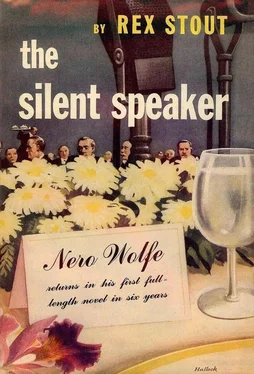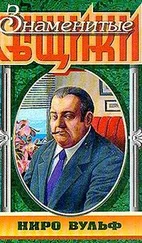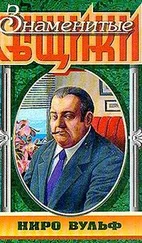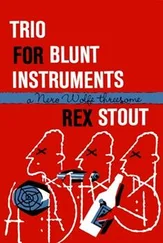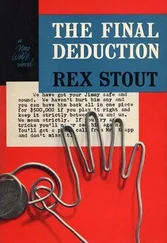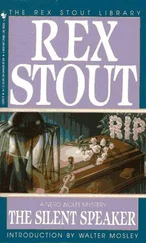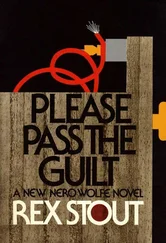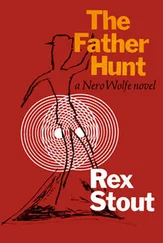“Go ahead.”
I proceeded with the concert. Lunch intervened at the end of the sixth movement, and after a leisurely but not especially gay meal we returned to the office and finished them up. There was nothing spectacular anywhere in the lot, though some of them contained matter that was certainly confidential; and considered as clues that might help solve a murder, I wouldn’t have paid a dime for them. In four others besides number one there was evidence, some of it conclusive, that they had been dictated earlier than March 26th.
I couldn’t blame Wolfe for being depressed. In addition to all the other complications, there were at least eight possible explanations of how leather case number four happened, when found, to contain cylinders dictated prior to the day of the murder, the simplest of all being that Boone himself had picked up the wrong case when he left his Washington office that afternoon. Not to mention the basic question, for which I didn’t have even a guess, let alone an answer: were the cylinders only a side show or were they part of the main performance?
Leaning back in his chair digesting, Wolfe was, to an unaccustomed eye though not to mine, sound asleep. He didn’t stir as I wheeled the machine out of the way, over to a corner. Then, as I went to his desk and started to return the cylinders to their nests in the case, his lids opened to make a slit.
He shook his head. “You’d better run them off again and make a transcription of them. Three carbons.” He glanced at the wall clock. “I’ll be going upstairs in thirty-five minutes. Do it then.”
“Yes, sir.” I was grim. “I expected this.”
“You did? I didn’t.”
“I don’t mean I expected the cylinders to be antiques. I expected this typewriting job. That’s the level this case seems to have descended to.”
“Don’t badger me. I was an ass to undertake it. I have more Cattleyas than I have room for, and I could have sold five hundred of them for twelve thousand dollars.” He let his eyes come half open. “When you have finished transcribing these things, take them down to Mr. Cramer and tell him how we got them.”
“Tell him everything?”
“Yes. But before you go to him do another typing job. Your notebook. Send this letter to everyone who was here Friday evening.” He frowned for words, and in a moment dictated, “ ‘Since you were good enough to come to my office at my invitation Friday evening, and since you were present when it was intimated that Miss Gunther’s statement that she had left the leather case on the window sill of the reception room might not deserve credence, I am writing to inform you of a development that occurred today. Paragraph. Mr. Don O’Neill received in the mail a ticket for a parcel that had been checked at Grand Central Station. The parcel proved to be the leather case in question, with the figure four stamped on the lid as described by Miss Gunther. However, most of the cylinders it contained were obviously dictated by Mr. Boone prior to March 26th. I send you this information in justice to Miss Gunther.’ ”
“That’s all?” I inquired.
“Yes.”
“Cramer will throw a fit.”
“No doubt. Mail them before you go to him, and take him a carbon. Then bring Miss Gunther here.”
“Her? Phoebe Gunther?”
“Yes.”
“That’s dangerous. Isn’t it too risky to trust me with her?”
“Yes. But I want to see her.”
“Okay, it’s on you.”
Two hours and more of back-breaking drudgery. Ten whole cylinders. Three carbons. Not only that, it was new to me and I had to adjust the speed about twenty times before I got the knack of it. When I finally got it finished and the sheets collated, I gave the original to Wolfe, who was back in the office by that time, placed the first two carbons in the safe, and folded the third carbon and stuck it in my pocket. Then there were the dozen letters to be typed and envelopes for same. As Wolfe signed them he folded and inserted them, and even sealed the envelopes. Sometimes he has bursts of feverish energy that are uncontrollable. By that time it was the dinner hour, but I decided not to dawdle through a meal in the dining room with Wolfe and made a quickie of it in the kitchen.
I had phoned the Homicide Squad office to make sure that Cramer would be on hand, to avoid having to deal with Lieutenant Rowcliffe, whose murder I hoped to help investigate some day, and had also called Phoebe Gunther’s apartment to make a date but got no answer. Getting the car from the garage, I went first to Eighth Avenue to drop the letters in the post office and then headed south for Twentieth Street.
After I had been in with Cramer ten minutes he said, “This sounds like something. I’ll be damned.”
After another twenty minutes he said, “This sounds like something. I’ll be damned.”
That, of course, showed clear as day where he stood — up to his hips in a swamp. If he had been anywhere near dry ground, or even in sight of some, he would have waved his prerogative in front of my nose and cussed Wolfe and me up one side and down the other for withholding evidence for nine hours and fourteen minutes and so forth, including threats, growls, and warnings. Instead of which, at one point it looked as if he might abandon all restraint and thank me. Obviously he was desperate.
When I left Cramer I still had the carbon of the transcription in my pocket, because it was not intended for him. If I was to take Phoebe Gunther to Wolfe it was desirable that I get her before Cramer did, and it seemed likely that he would want to know exactly what was on those cylinders before he started a roundup. So I had kept it sketchy and hadn’t told him that a transcription had been made.
Also I wasted no time getting to Fifty-fifth Street.
The doorman phoned up, gave me another look of surprise when he turned to tell me I would be received, and called an okay to the elevator. Up at Nine H, Phoebe opened the door and allowed me to enter. I put my coat and hat on a chair and followed her into the room, and there was Alger Kates over in the corner where the light was dim.
I will not deny that I am often forthright, but I would put up an argument if anyone called me crude. Yet, at sight of Kates there again, I said what I said. I suppose it could be interpreted different ways. I do not concede that Phoebe Gunther had me fidgeting on a string, but the fact remains that I stared at Alger Kates and demanded:
“Do you live here?”
He stared back and replied, “If it’s any of your business, yes, I do.”
“Sit down, Mr. Goodwin.” Phoebe possibly smiled. She got against the cushions on the couch. “I’ll straighten it out. Mr. Kates does live here, when he’s in New York. His wife keeps this apartment because she can’t stand Washington. Right now she’s in Florida. I couldn’t get a hotel room, so Mr. Kates is staying with friends on Eleventh Street and letting me sleep here. Does that clear me? And him?”
Naturally I felt foolish. “I’ll take it up,” I said, “with the Housing Administration and see what I can do. Meanwhile I may be in a hurry, depending on how urgent Inspector Cramer feels. When I phoned you about an hour ago there was no answer.”
She reached for a cigarette. “Why, do I need clearance on that too? I was out for a bite to eat.”
“Has Cramer’s office called since you returned?”
“No.” She was frowning. “Does he want me? What for?”
“He either wants you now or he soon will.” It was in the line of duty to keep my eyes fastened to her, to get her reaction. “I just took him that case of cylinders that you left on a window sill Tuesday evening.”
I do not believe there was any menace in my tone. I don’t know where it would have come from, as I did not at that time regard myself as a menace to Miss Gunther. But Alger Kates suddenly stood up, as if I had brandished a monkey wrench at her. He immediately sat down again. She kept her seat, but stopped her cigarette abruptly on its way to her lips, and the muscles of her neck stiffened.
Читать дальше
